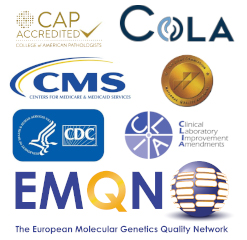Inherited Disease Screening
WHY WE’RE DIFFERENT
EXCLUSIVE PARTNERS
- Perkin Elmer
- Sngene Lab
- Genique lifesciences

Inherited Disease Screening
For a range of inherited conditions and disorders, symptoms do not always allow for a definitive diagnosis to be made. Basing a diagnosis on clinical symptoms alone can also result in an incorrect or delayed diagnosis. [1] Obtaining an accurate diagnosis through genetic testing can have significant positive outcomes for patients and their health care providers, by clarifying the diagnosis and helping to identify treatment options sooner. It can also assist in identifying the risk of occurrence in family members, who may be carriers of a genetic mutation. This can help facilitate preconception or prenatal testing for family members who may be planning to start a family.
What is an inherited disease?
An inherited disease is a disease or disorder caused by an abnormality in our DNA which affects cells throughout our body. The result of the abnormality can range from almost indistinguishable through to major problems. More than 6000 disorders are caused by changes in a single gene and are known as monogenic or Mendelian disorders. Whilst individually each disease is rare, about 25% of people will carry at least one abnormal mutation for one of these diseases, resulting in disease in about 1 in every 200 births.
Things to consider before having a genetic test
If you are considering having genetic testing, we strongly recommend you discuss it with your doctor or a genetic counsellor first. They will be able to provide you with information on testing, the implications of having the testing done and help you understand and interpret your results should you decide to go ahead with testing.
The results from genetic testing, whether positive or negative for a genetic mutation, can be beneficial. It can provide relief from uncertainty and assist in making informed decisions regarding your health and treatment plans. Positive results can help direct you towards available preventions or treatments and assist in monitoring your health status.
It should also be considered that genetic testing can only provide a limited amount of information about an inherited condition. While testing may reveal a genetic mutation, it can’t always determine if a person will show symptoms of a disorder, how severe their symptoms will be or if the disorder will progress over time. There also may not be treatment strategies available for the genetic disorder you are diagnosed with.
Sometimes genetic testing can also reveal unexpected results. If results reveal an inherited mutation, this can also have implications for family members who may not want to go ahead with testing or know the results from testing. We recommend you also talk to your relatives about genetic testing before proceeding.
As inherited disease testing and the results from such tests can be complex, we strongly recommend you seek Genetic Counselling both prior to and after testing. A Genetic Counsellor can explain in detail the benefits, risks and limitations of having genetic testing done, and help you understand your results and the impacts they may have for both you and your family.
What kind of testing options are available?
Codex has one of the largest genetic testing options of any Genetic laboratory/center in Egypt. Our testing range covers over 3,000 genes associated with a whole range of inherited disorders.
Single & Multi-Gene Panels
Many genetic conditions are caused by variants in a single gene, and these are known as single gene disorders. Codex can perform single gene analysis using our custom designed panels. Common single gene disorders we test for include Thalassemia, muscle dystrophies, Cystic Fibrosis and SMA. We can also utilise our multi-gene panels, where clinical symptoms may not necessarily correspond to one specific inherited disorder, or to test for disorders that are commonly associated with more than one gene. We offer a range of multi-gene panels, including panels specifically designed for cardiovascular disorders and neurological disorders, and multi-gene panels targeted to inherited disorders such as Stickler Syndrome, Ehlers-Danlos Syndrome, Noonan Syndrome and Alport Syndrome.
BRCA Gene Testing
5 – 10% of breast cancers are attributable to BRCA1 or BRCA2 mutations. These mutations can be sporadic, but they are often germline, which means they are in all cells in your body and have the possibility to be passed down to your children. The incidence of breast cancer in individuals with BRCA1 or BRCA2 germline mutations is 20 – 30 times higher than those without the mutations. Our BRCA Plus Panel can identify BRCA1 or BRCA2 variants and determine whether they are of germline origin. If germline mutations are detected, family members can also be tested to see if they have inherited the increased risk for Breast cancer, enabling earlier detection and prevention in family members.
If you are considering starting a family, genetic testing can also help with making informed reproductive decisions. A range of genetic testing options are available both prior to and post conception.
Extended Carrier Screening
Extended Carrier Screening is an important tool for prospective parents to help them determine their risk of having a child affected with a heritable disease. In many cases parents do not have any idea that they are carriers and have no family history or health symptoms due to the rarity of some diseases in the general population. Through Next Generation Sequencing (NGS) we are able to conduct Extended Carrier Screening (ECS), Extended Carrier Screening consists of a large panel that is able to analyse specific genes that are associated with hundreds of autosomal recessive and X-linked disorders to prospective parents in a general mixed population.
Prenatal Genetic Screening
Offering a highly accurate, Non-Invasive Prenatal Screening (NIPS) for chromosomal abnormalities. NIFTYTM uses a blood sample from the pregnant mother to analyse the fetal DNA for chromosomal conditions including trisomies, such as Down Syndrome and Edwards Syndrome, Sex Chromosomal Aneuploidies and Deletion/Duplication Syndromes.
Newborn Genetic Screening
Newborn genetic screening test can determine a baby’s risk for 87 inherited disorders, as well as providing personalised genetic information on their likely response to 32 commonly administered paediatric drugs. It is the most comprehensive and accurate newborn screening test on the market, with over 99% accuracy. Testing may be completed using a non-invasive cheek swab, that is painless and risk free for your child.
How much does testing cost?
Genetic testing can be complex, and pricing varies depending on what condition or disorder you would like to be tested for, and the number of genes commonly associated with that condition. Please contact us for a quote.
How do I organise testing?
- Download our Request Form and brochures. Book an appointment with your doctor or healthcare professional to discuss the testing and have the request form signed.
- Return your completed Request Form to Codex, along with any supporting information such as clinical and family history.
- Codex will send you a specialized blood collection kit, which you will need to take your local doctor or pathology centre to have your sample collected.
- Once we receive your sample and payment, we begin testing and your results will be sent to your health care provider in 14 – 21 working days
References
- Joseph, L., M. Cankovic, et al. (2016). “The Spectrum of Clinical Utilities in Molecular Pathology Testing Procedures for Inherited Conditions and Cancer: A Report of the Association for Molecular Pathology.” J Mol Diagn 18(5): 605-619.
